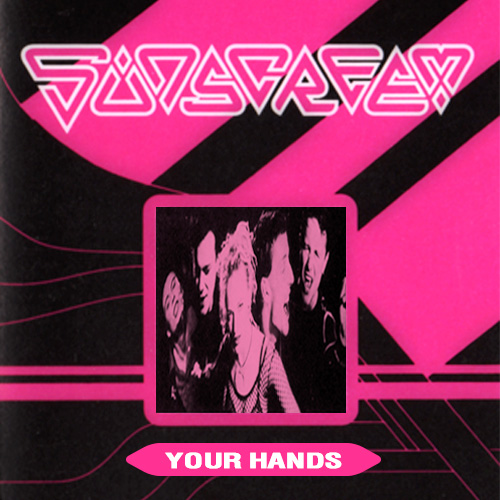Menu
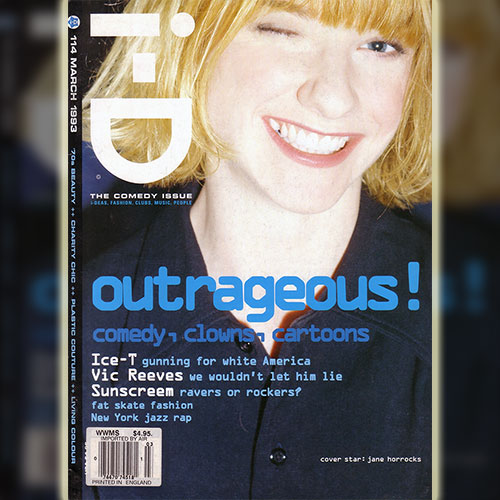
i-D
Perfect Pop
by Celia Duncan / i-D The Comedy Issue No. 114, March 1993 / © 1993 i-D
A chart-friendly combination of dancefloor rhythms and singalong tunes, Sunscreem are a marketing man’s dream. But they’re determined to follow their own path…
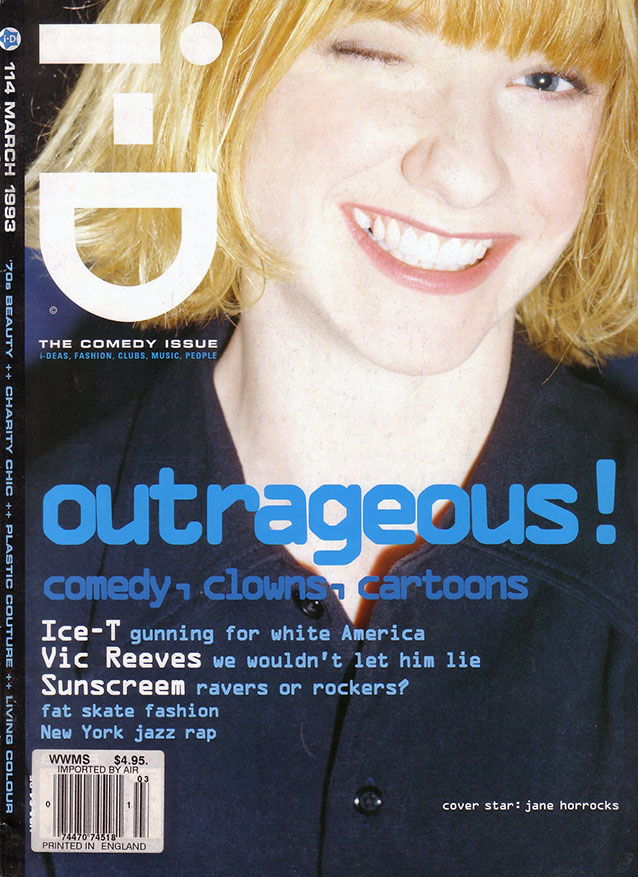
A rave-pop outfit fronted by a blonde Essex girl which tours with Jesus Jones, is remixed by Boys Own, has a heavy metal logo and sings about global warming. Confused? So are they. Sunscreem have an identity crisis.
Take an upfront indie vocalist with blonde grunge dreads, Lucia Holm; a sunny techno meister, Paul Carnell; a moody rock guitarist, Darren Woodford; mix in “Northern Soul fiend and raver,” Rob Fricker on bass, and a beady-eyed dubwise drummer, Sean Wright; add generous amounts of Jack Daniels and coke, two superfluous male groovers, and you end up with Sunscreem – the resonant explosion of a Yamaha DX7’s synth sound reincarnated in flesh.
With five hit singles and a ferocious debut album O3 (the chemical formula for ozone) catapulting them into commercially-successful house domination, Sunscreem look set to follow in the well-heeled footsteps of fellow Essex-born rave-turned-pop act The Prodigy.
The only problem is, they don’t want to. The only way, it seems, to satisfy the conflicting quinquereme is to keep “five feet in five different music camps,” as Paul Carnell puts it. “We thrive on paradoxes.”
The underlying enigma of Sunscreem is how Top Of The Pops regulars and major label signings can sell so well in independent record shops. The answer, perhaps, lies in the quantity and diversity of their remixes. Last year’s melancholy Perfect Motion was retailored as frantic hardcore by Carl Cox, trance-techno by Leftfield and hypnotic sequential synth chords by Boys Own’s Terry Farley and Pete Heller, thus satisfying every subdivision of house music in clubland.
The rerelease of Pressure this month will be the third track to be transformed from mainstream High Street to a club couture sound by the Boys Own duo of Farley and Heller. The incongruity of Essex ravers working with the cultural élite of the club world is admittedly puzzling. “The songs stand up on their own. We’re not working with people just because they’re trendy,” explains Terry Farley. “I’m very against remixing Paul McCartney and Lulu records – they’re just using house music to sell a product. Sunscreem are genuinely into it.”
Sunscreem’s roots are unashamedly Summer Of ’88. Even though only three out of the five – Lucia, Paul and Darren – were playing together at this stage under the name Shot The Rapids, the early rave influence reoccurs throughout their album whenever the familiar acid SH101 modulator warps the pitch or Balearic piano riffs dominate an instrumental. “The second time I was out raving I heard a track with a rock riff and a house beat,” says Lucia. “I don’t know who did it but I immediately went back and tried it out for myself.” The result was Psycho, the last track on the album. “That’s how we get a lot of our inspiration.”
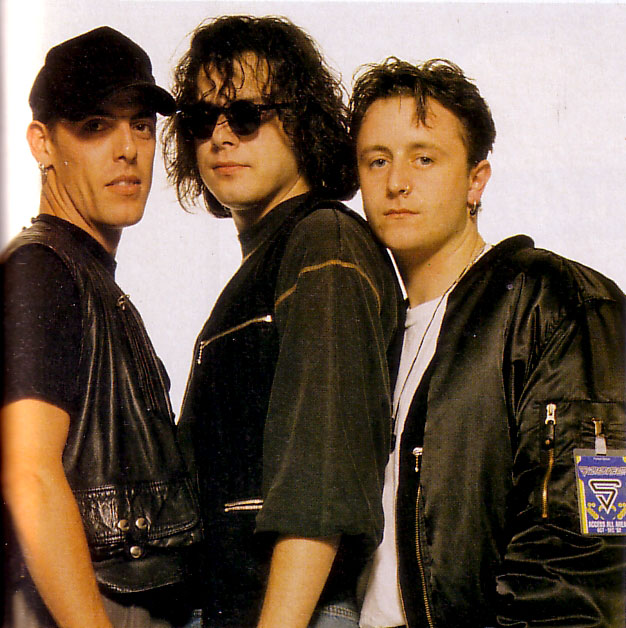
Sean Wright and Rob Fricker were adopted into the rural collective in February 1990. From organizing their first appearance at a rave in East London to spontaneous parties at a 14th Century milking shed in Chelmsford (which is now their 24-track studio, The Retreat), Sunscreem began to carve themselves an individual niche in the club circuit.
From organizing their first appearance at a rave in East London to spontaneous parties at a 14th Century milking shed in Chelmsford (which is now their 24-track studio, The Retreat), Sunscreem began to carve themselves an individual niche in the club circuit. They are one of the few rave acts to incorporate live instruments into an otherwise synthesized set as opposed to miming to a DAT tape, and create catchy, chart-friendly refrains that transcend the confines of the dancefloor.
Their record label, Sony Soho Square, are open about their intentions to mould the group into an internationally successful pop group. With the continued overall decline in the singles market, major labels need to sell albums to recoup their investment in new bands. This has, inevitably, proved a problem with dance acts who are more at home on white label remixes than CDs. “Singles don’t make money,” states Diane Young, A&R Manager at Sony Soho Square, who signed Sunscreem. “They are just promotional tools to raise awareness.” With O3 released simultaneously in the States and Britain, Sony are aiming Sunscreem for the global mainstream. “What they are doing – combining strong songs with dancefloor ideas – is very interesting,” continues Young. “I think they’ll be one of the first acts to break through form the dancefloor and sell albums.”
Sunscreem, however, don’t feel entirely comfortable with this. “At the end of the day they want to turn us into pop icons, as all the dance stuff is on the whole pretty anonymous,” says Paul Carnell. “They’re just trying to sell a product – it’s as cynical and calculating as that.”
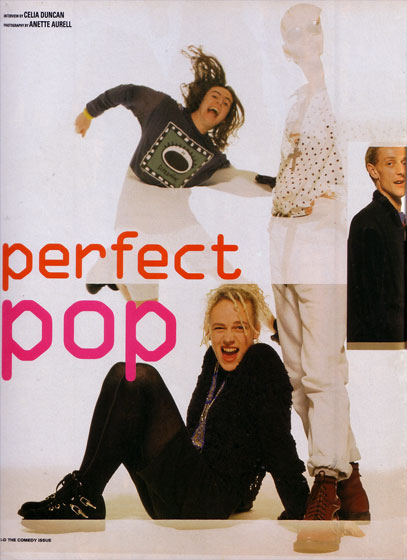
The marketing strategy inevitably means using an easily identifiable figure-head to front the act. Enter reluctant Lucia. “Lucia had this really distinctive look – the blonde Rasta hair and everything,” says Sony’s Diane Young, recalling her first impression of the band. “I thought it was really unusual. You get a lot of dodgy boilers fronting acts, but here was a woman who didn’t need to wear a mini-skirt to attract attention.” Lucia undermines the blonde-bombshell-fronts-faceless-male-backing-band cliché by spending much of her onstage time on the backline, playing keyboards, only heading stage front to deliver the vocals.
A certain confusion about who Sunscreem actually are (lack of frontperson, anonymous packaging, club pedigree) has held them back to some extent. “Radio 1 has never palylisted any of our tracks,” protests Lucia, “and Gallup (the chart compilers) knocked Love U More down from its original chart position because they thought something funny was going on in the independent record market.”
“The music business gets frustrated because they don’t know where to place us,” laughs Paul. “They didn’t create us or manufacture us like they did with Suede, for example. We did it ourselves.”
There’s another paradox, between Sunscreem’s easy-listening music and the brutality of their lyrics. The swirling, melodic vocal line of Pressure masks the claustrophobia, isolation and pain expressed in the words. Similarly, in Love U More, the lyrics “We can turn wine into water / As fathers rape their daughters,” an attempt to convey the underlying brutality of contemporary society despite technological advances, were masked by melody and went uncensored by the BBC on Top Of The Pops. It’s this hybrid, both musical and lyrical, that keeps Sunscreem one step ahead. “We take the clichés of the music world and pervert them.” Paul’s eyes light up mischievously. “Yeah – what we’re really trying to do is destroy the whole music business.”
Gallery



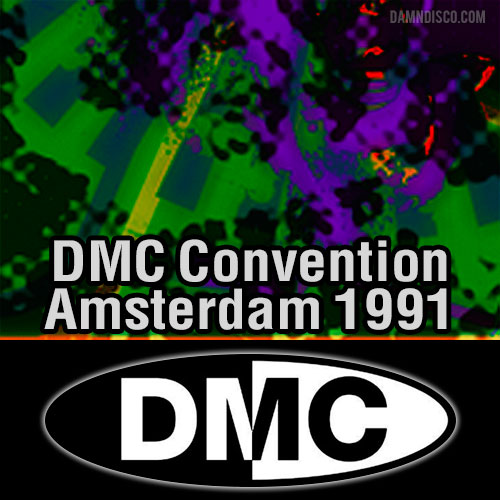
Live at DMC ’91
Title:
Live at DMC '91
Artist:
Sunscreem
Links:
Performed and recorded live at the annual Disco Mix Club convention in Amsterdam (1991).
℗ 2012 Annalogic Ltd.
Live set tracklist
- Portal 1:55 [0:00]
- Your Hands 2:42 [1:55]
- Walk On (D-Cubed) 3:19 [4:37]
- Walk On 3:52 [7:56]
- Love U More 3:54 [11:48]
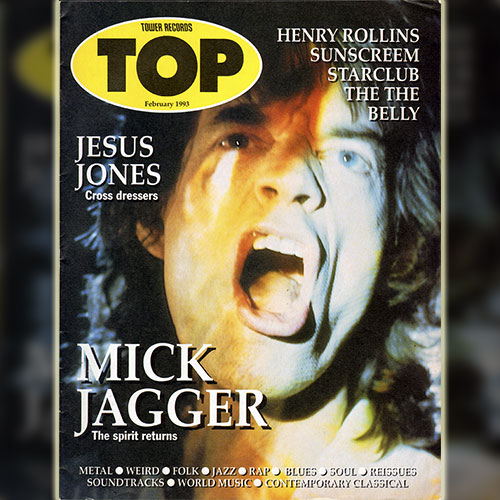
TOP
Sunscreem: Perfect Live Motion
by Paul Tierney / TOP, Feb 1993 / © 1993 TOP
Backstage at The Word there’s an unusual blend of soporific calm and barely contained chaos.
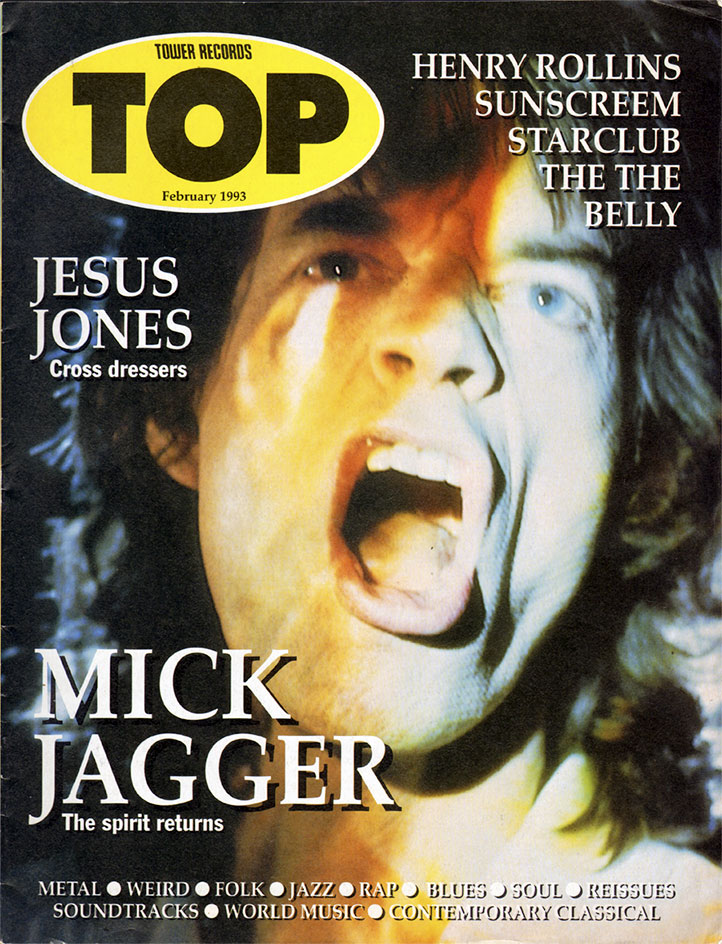
Presenter Katie Puckrick sits alone in the canteen playing with a plate of brussel sprouts, Sister Sledge slink past in a shimmering lurex line, en route to a soundcheck, and a frazzled-looking researcher attempts to find red roses in Wembley for tonight’s star guest Zsa Zsa Gabor. Her other, slightly easier task, is to locate Sunscreem, the motley bunch eagerly feeding in the corner. Easier, that is, if only she knew who they were. Never mind, Essex’s most credible export is unlikely to remain this anonymous for long.
Last year Sunscreem cracked the charts with Perfect Motion, recorded their debut album, O3, and walked off with the DMC Best Newcomer Award. Not bad considering that most people assumed from their logo that they must be some sort of fledgling Iron Maiden. “It’s down to the fact that we’ve played practically every Poly, university and club there is, twice!” explains singer Lucia Holm.
Sunscreem stress that they are very much a live band. Not for them the inane route of arriving with DAT and miming along to a couple of tracks. “You might as well be listening to the DJ,” says keyboard player Paul Carnell. “We like to be in control of our sound and change things according to our mood, otherwise it would get pretty monotonous.”
“We’re a bit of a hybrid in some respects,” he continues. “We’ve got this energy from dance music coming through with the drum and bass sound, but a lot of the set is very guitar-oriented. By adding this sort of texture we’ve gained a kind of crossover appeal.”
Hard to label but easy to like, Sunscreem’s sound is a curious blend of trance soundscapes, nagging hooks, clever digital layering and Lucia’s powerful vocals. “We actually share all the writing,” laughs Lucia, twisting one of her blonde dreadlocks around a finger. “This can often lead to some quite unusual-sounding couplets. I think some people might be a bit shocked if they listened to the lyrics more closely!”
Close allies in the band’s fortunes have been the teams of remixers drafted in to add that extra club zest. Among others, Scotland’s Slam, Boys Own and Leftfield have slapped their inimitable personalities onto the wax. It’s an increasingly common practice but often many bands feel cheated out of their own arrangements.
“It’s not something we’re particularly precious about,” shrugs Lucia.
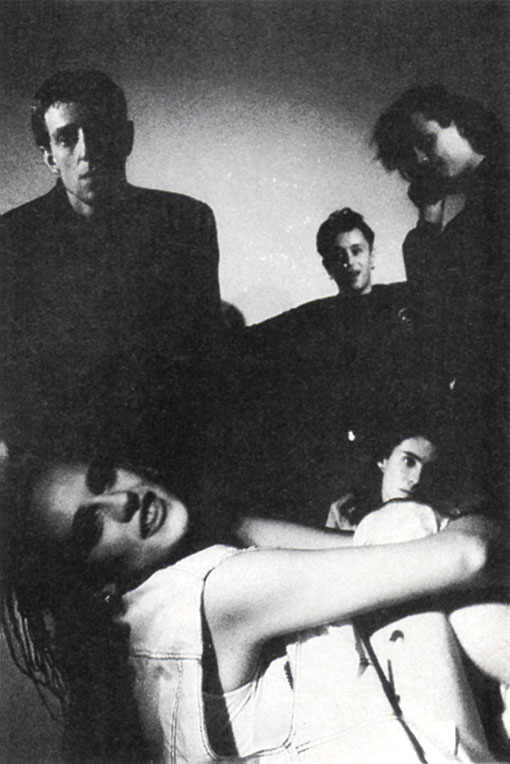
“At the end of the day the song is still ours and I’m always interested to hear how other people interpret what we’ve done. But I admit it can get out of hand when there are ten or so mixes floating around of the same song. Somehow the original idea becomes less definitive.” Which is not unlike the way the band themselves have covered Marianne Faithfull’s Broken English.
“Sunscreem?” enquires the researcher, popping her head round the door. “What exactly does that mean?”
“It’s our favourite synth sound,” replies Lucia, “very percussive and resonant.” And with any luck a note that will resound for some time to come.
Gallery


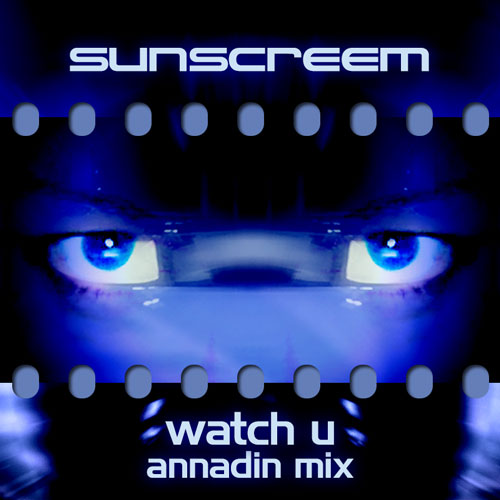
Watch U (Annadin)
Title:
Watch U (Annadin Mix)
Artist:
Sunscreem
Notes:
⮾ Unreleased
Written by Holm / Lazario / Carnell / Fricker / Valentine. Produced by Sunscreem.
℗ 2009 Annalogic Ltd.
Watch U (Annadin Mix) was released via the audio player on Valentine’s Day 2009, to coincide with the re-launch of the official website and as a gift from the band to the fans. In January 2022, the band continued the tradition and provided the previously unreleased original mix of Watch U to mark the re-launch of DamnDisco.com.
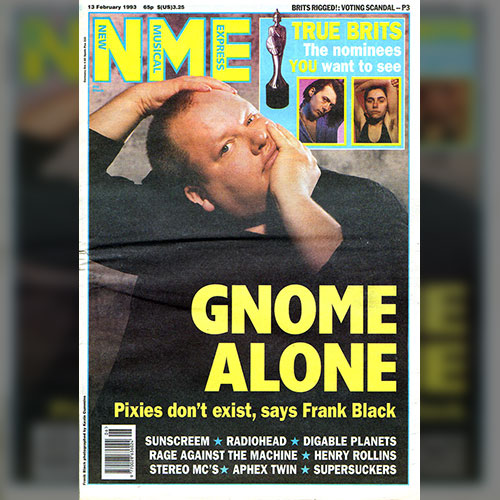
NME February 93
Brill 'Creem
by Roger Morton / 13 February 1993 / © 1993 NME
Three Top 20 hits and a debut album that really gets to the grips with the dance/rock hybrid, and still SUNSCREEM remain anonymous, ‘just one of those dance bands’. ROGER MORTON passes on the bowls of Jelly Tots to grab a beer with the Keef and Marianne of the ’90s.
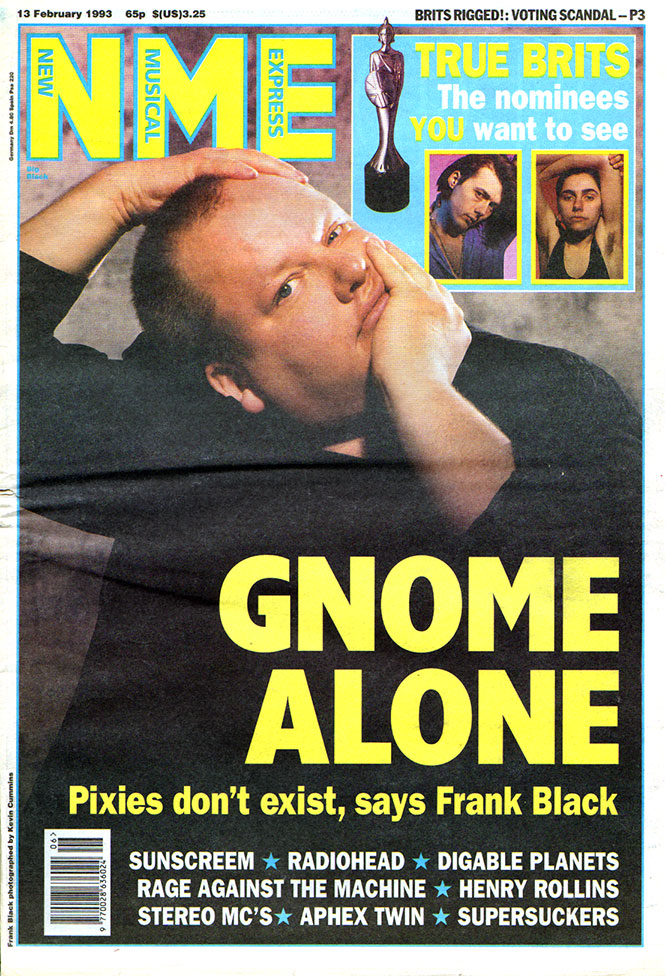
“Champagne? No-one ever gives us champagne. The most I think we’ve ever been given is pop and sweets. We went along to do this interview at a radio station and they had all these Jelly Tots for us. They said ‘You’re one of them dance bands, aren’t you? I thought you all liked Jelly Tots’.”
In a hire car twisting through the back streets of Camden, Lucia, Sunscreem’s Goldilocks lead singer, sits back and sighs. In two hours’ time she’s to perform a nerve-yanking live musical striptease for the cameras of MTV. Darren, Sunscreem’s guitar slasher, sits next to her on the back seat, slowly metamorphosising into Keith Richards, on the grounds that if Keef could drop his guitar at Live Aid and still stagger tall, then he can do a televised live acoustic version of the band’s Love U More with a six-string that hasn’t been tuned for a fortnight.
Sunscreem are about to busk it in good old fashioned r’n’r style. In a hushed studio, they’ll jam through the song, adrenaline pumping, tendons taut, and expose the ice-melting poetry and stained glass tunesmithery at the heart of the normally danced-up Love U More. They’ll perform with the cool of Nico and Lou doing Femme Fatale while looking a lot less scary than the Cocteau Twins. They’ll pull off the traditional singer-songwriter duo thing with aplomb.
But Lucia still has cause to sigh. She knows that the next time they turn up for a radio show, the one-of-them-dance-bands syndrome will still be there. And so, probably, will the Jelly Tots. Sunscreem, three proper pop hits and a debut album down the line, are still struggling against mistaken identity.
“So how are you doing, Lucinda?” says Alf Garnett, the car driver.
“It’s not Lucinda, it’s Lucia,” says Lucia.
“Well, when I first drove you two years ago you were introduced to me as Lucinda,” says Alf. “So you’re Lucinda to me.”
There is a lot of Alf Garnetts about. And pop has more than its fair share.
When Sunscreem hijacked their name from a strange and unpredictable sound on a Yamaha synth back at the end of ’89, it all seemed quite logical. The Chelmsford three – Lucia Holm, Darren Woodford and long-limbed keyboardist Paul Carnell – had done their time in various banging and plucking local bands. They had immersed themselves in the post-acid house club/rave scene around Essex.
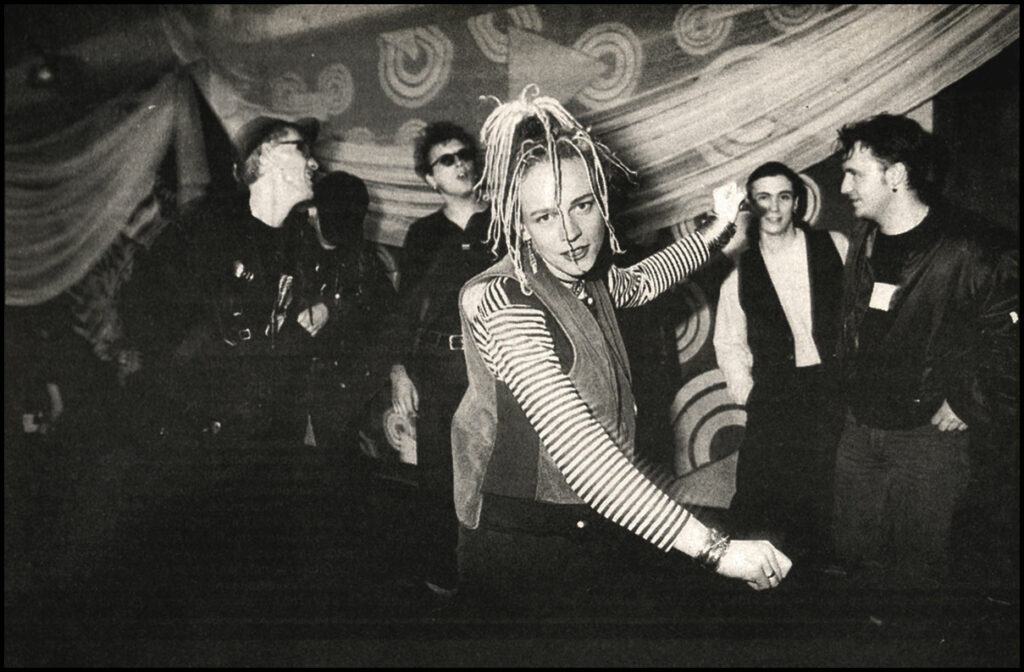
By mid-1990, fed up with miming PAs and offering token gesture ‘live’ performances, it just seemed obvious to them that you could do more with the energy rush of house than lip-synch to a patched-on sample.
They had Lucia, with a blue sky voice that could fly with the beats. They had a proper drummer mate, Sean Wright, a frenzy-fingered bassist buddy Rob Fricker, twitch-happy dancer friends Tony and Gary, and a willing local DJ, Dave Valentine. They also had a converted 14th Century milking shed to rehearse and record in. Surely, they assumed, the world was ready for the non-particularly-radical concept of some songs with some dance.
Flicker, flicker… There’s Paul up on the video screen at MTV, cyborg shades clamped on and mouth in action.
“It just seemed obvious to me when house came along that that was the music for the next 20 or 30 years, like R&B was when that came long…”
Obvious, no? What Sunscreem reckoned without was Alf Garnett. Or, at least, the Alf Garnett factor in pop that refuses to embrace the unfamiliar, that only wants to know what it already knows. Until the sales figures start coming in.
For a year-and-a-half, Sunscreem gigged solidly at dance parties, colleges, Reading Festival, the lot. Their media coverage was at best tokenistic. For all their live fire and playing prowess, they found themselves fighting an uphill battle against two armies of Alf Garnetts. One lot thought they were a ‘rave’ act and therefore intrinsically unworthy. The other lot thought they were Blondie.
Ask Sunscreem about the last 12 months and they will talk about “the struggle.” All new bands, of course, have to fight for elbow space. But not all of them need three Top 20 hits (Love U More, Perfect Motion and their version of Marianne Faithfull’s Broken English) before they’re acknowledged. Not all of them have to fight a losing battle with their record company (they’re on Sony’s S2 subsidiary) to be allowed to produce and mix their own album.
Sunscreem are not naïve.
“It’s the oldest trick in the book,” laughs Paul, as he explains how their American label has managed to go against their wishes and release their LP with Lucia-centered band photo on the sleeve. They’re just a little regretful that it has to be like that.
“We get a lot of, ‘Oh you’ve got to pull her out and make her much more sexy, and they’re her backing band really’,” says Lucia. “And that’s not the way we want to go about it at all. It’s not the way we are as personalities.”
“It’s not surprising, businessmen making judgements on that sort of thing,” adds Paul. “A lot of people get pushed into it, and I guess we were when we started out, there was a lot of that and we couldn’t contain it at all. In our first year that’s what everyone thought we were – a plastic pop band – and to a certain extent you’re forced to go along with it. It’s just a bit of a shame.”
If there’s cause for pop Alf Gernetts to be wary of Sunscreem it’s not because they’re about to infect the airwaves with a killer techno virus. Their O3 album is an uplifting, song-led, organic incorporation of clubland aesthetics into mainstream pop. It might awaken your Eurythmics fan in the street to the adventureworld potential of techno, but mass suicide of guitar teachers is unlikely. What might, however, be a little disconcerting to pop xenophobes is Sunscreem’s conspicuous lack of pop star wannabe instincts.
Meeting Lucia for the first time six months ago, she tried hard to hide in a corner. When trapped, she explained in a low whisper how she’d been hijacked into being a singer in the first place, and considered gardening to be a more suitable profession. It might just be significant that, whereas those at the fore of guitar band culture are happy to parade as personalities, Sunscreem, emerging triumphantly from a world of white label anonymity, are somewhat shy. It might just be that the priorities of the next generation of pop’s leading lights will be genuinely different.
“I don’t hate being a singer, but I do find it very uncomfortable to get up onstage,” admits Lucia. “I’m getting used to it, but I still have to lock myself in the toilet for about an hour before I go on. I’m very different off stage than when I’m on. It’s not an act, it’s just another side of me.
Normally I’m very quiet and not particularly boisterous. I don’t clump around the place. I don’t really want to be a media personality. So here I am talking to you. Ha ha! But you know, not in the sense that Madonna is, or Courtney Love is. I wouldn’t like to be like that. Everyone in the band just wants to travel and have a laugh basically. And play music.”
“It’s a buzz if people get into the music, and getting critically acclaimed for what you’ve done is excellent,” adds Paul. “But the rest of it is just embarrassing. We freaked a but the other day at The Word because there were a couple of tabloid photographers taking pictures in the dressing room, and that was like ‘F—, they’re in the dressing room, what the f— is going on?’ I guess if we were like Take That it’d be fine, but everyone’s in this band for the music and the crack, not the ‘Oh I’ve got to be famous’.”
It is a balancing act for Sunscreem. They’re not in the business of simply writing a score for whatever dubious substances are being handed out in clubland. But a good part of their raison d’être can be put down to a desire to translate the euphoria-drome atmosphere of wild club nights into a more complex language.
Paul: “The majority of our music is done while being straight. There’s no point in making music that only appeals to people who are in clubs who are off their heads. But then you don’t have to have smoked opium to appreciate a poet who’s been inspired by it. And most of Shakespeare you can read without taking magic mushrooms.”
Shakespeare was on magic mushrooms?
Paul: “Well, I mean, A Midsummer Night’s Dream? C’mon! Sometimes I think it would be a bit more healthy if people were made a bit more aware of that type of thing.”
Lucia: “But there are other highs as well. I mean, there’s sex. There’s all sorts of things that are probably far better than Ecstasy thank you very much. And it’s also about that. That sort of euphoric, spiritual high. I remember when I first went out to clubs it was very much a spiritual experience. Lots of people will laugh at me for saying this, but it’s true. It was very much like visiting a Baptist church. It’s that sort of spirit.
I get very frightened by large groups of people, but there are certain types of clubs where that was all changed for me. It proved that people could be nice as well as being able to incite themselves to loot and riot and rape through the power of being together, the crowd psychology thing. It proved that it didn’t have to be like that.”
Then again, although Sunscreem have gone way beyond the realms of introspective studio boffinry, their attitudes are sufficiently coloured by primary roots in pure dance noise to be wary of trying to explain the meaning of life in a four-minute song. The Shamen they are not.
“If you feel strongly about something and write about it, it’s not that you feel you’re going to change anybody’s life,” says Lucia. “But you still want to make the point. I think we do it quite subtly though.”
So Sunscreem have titled their LP O3 – after the oxygen atoms that should be where the holes in the ozone layer are – not because they’re about to join Sting in the rainforest, but because they thought a subtle nod in that direction was a good idea.
“I’ve always been interested in the balance of things,” says Lucia, cringing visibly.
“It’s true. If you just unbalance something in nature you have a whole chain reaction and it can cause devastation. I’ve always watched programmes about how man is destroying the earth. Maybe it’s a morbid fascination I have. But it’s really important to me. I spent a little time on a farm, it was an organic farm, and it just opened my eyes to the stuff we chuck down the drain. Even as one person, it’s pretty bad.”
As the band pull up at MTV studios, Darren growing ever more Keith Richards-like by the second, a miracle happens. A smart young man appears from an upstairs room and approaches the band.
“I’m in charge of hospitality,” he says.
Simultaneously, Lucia, Darren and Paul cringe like subjects in a Jelly Tots toxicity test. But then the miracle occurs.
“We’ve got a crate of beers for you upstairs,” says Mr Hospitality, and Sunscreem’s eyes light up. Maybe, slowly, the message is getting through. No Jelly Tots. Not just one of them dance bands.
What do you think of Keith Richards’ solo career?
Paul: “I haven’t actually noticed. I wouldn’t buy anything, but I’d go and see him live.”
I only ask you because people assume you have little connection with that sort of pop history.
Lucia: “It’s everything to do with it!”
Paul: “Quite the opposite. Darren is a serious expert on The Beatles and The Stones! I think that’s why we had the confidence to go out and say ‘Right. We’re a band. We’re here’.”
House Music of the Rising Sun
by Sam Steele / 13 February 1993 / © 1993 NME
Who are Sunscreem? You mean you don’t know yet?
It’s like this. With all the cross-fertilisation of dance with rock, techno and industrial hardcore, it’s inevitable that a band will emerge with a hybrid style all of their own. Sunscreem are that and they’ve taken their cue from sequencers and samplers, grafted on tight and slinky bass and haunting, pop-friendly melodies. Imagine Primal Scream with the rock guitars and Stones riffs, or The Orb without all that Tangerine Dreamness and bombed-out appeal… You’ve got it.
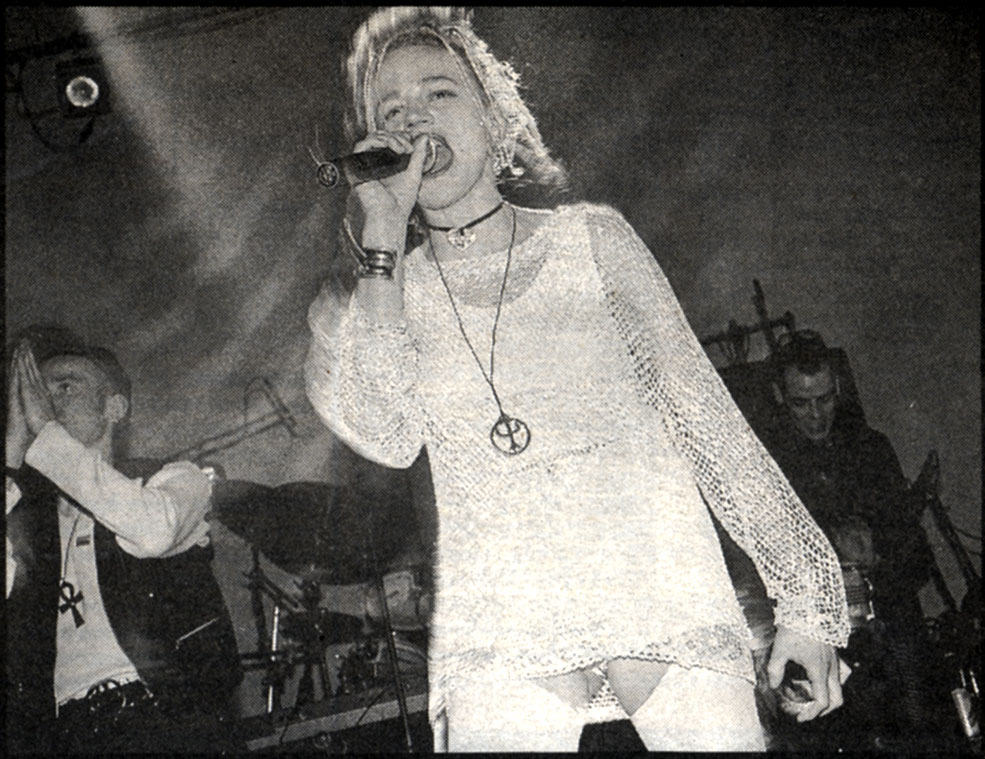
Having spend the last two years refining their style, increasing their following and organising their own raves, Sunscreem have made the quantum leap from PA personalities to bone-fide pop stars-in-the-making, infusing their recordings with the same kinetic energy that is the crux of their live performance, and which propelled two singles into the national charts last year. In fact, if their stunning debut album, O3 (out on Sony subsidiary S2 this month) is any indication, Sunscreem are, even as we speak, poised on the brink of a distinctly poptastic success.
Tonight, exhausted from a day spent being interviewed, soundchecking and dashing back from recording a slot for MTV, these five solar components are still capable of illuminating. Lead singer Lucia, (un)dressed in white shorts and stocking tops, effortlessly exudes the kind of devil-may-care sex appeal Wendy James has spent years trying to achieve and still hasn’t managed yet. Love U More and Perfect Motion are gloriously spun through with dance beats that subtly enhance rather than dominate the melodic harmonies and strange nuances of Lucia’s singing. And Walk On contains the kind of sparkling shenanigans of sound that could easily become an anthem of the dancing classes, with joyous hallelujah keys and vibrant rhythms bouncing around sassy vocals.
An organic derivation of harder-edged dance acts like Snap and 2 Unlimited, except with intelligent lyrics, gentle melodies and wide open grooves rubbing up against the outer edges of indie jangledom, Sunscreem are defining the standard of modern dance music. So now you know.
Gallery

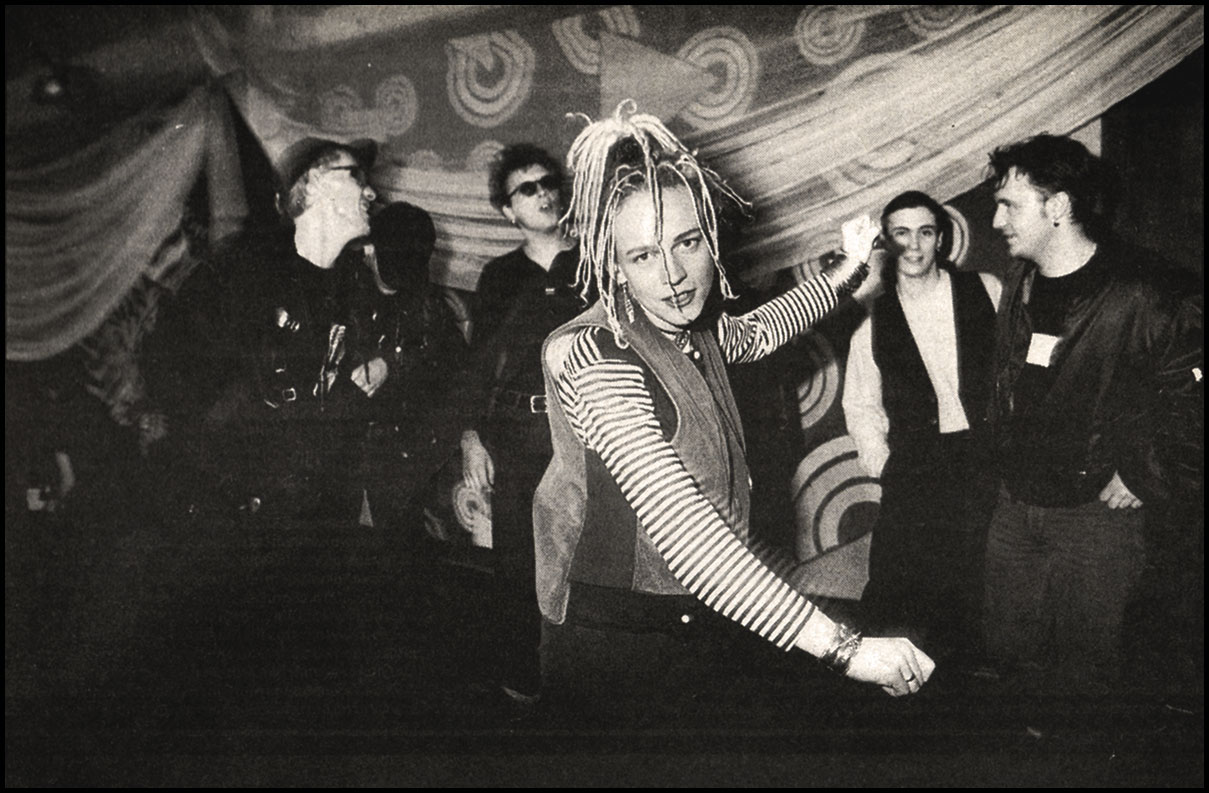

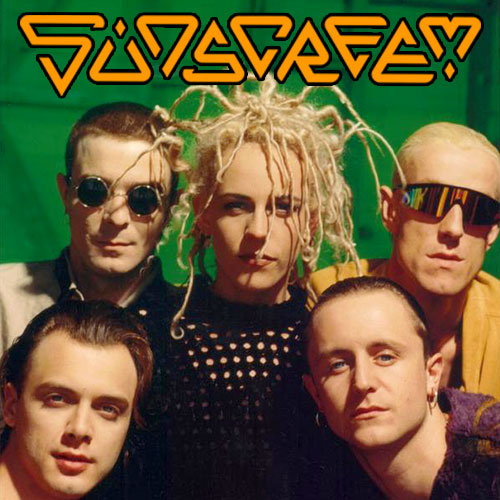
Columbia Records News Release
Sunscreem Biography
by Sherman of New Musical Express, UK for Columbia Records / © 1993 Columbia Records
I caught Sunscreem for the first time at a South London club in the autumn of ’91. Friends of friends. Come and see this band, they said, they play live. I was confused. To be absolutely honest, I was expecting dodgy indie/dance band, of which there was a spate around that time. To be honest, I was knocked out.
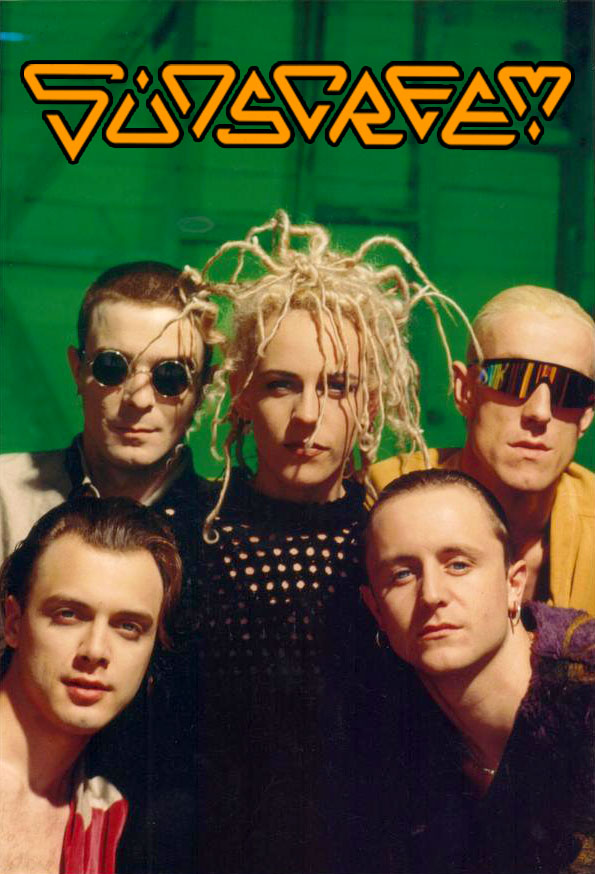
I’d witnessed countless PAs at raves, enjoying the spectacle but knowing all that was propelling them into the arena was a DAT tape and a couple of occasionally prodded samples from a propped up keyboard player. What Sunscreem offered wasn’t in the rulebook, this was like being at a ‘proper’ gig yet still being caught up in the full culture of clubbing.
Alongside the bouncing, dreadlocked, angelic-sounding vocalist and the keyboard player brutalizing his equipment, was a bass player who acid-danced whilst plucking out the tightest of guidelines, a guitarist who jacked about like Angus Young on a smiley binge, and a real drummer, machine-like in composure, who added weight to the assortment of sequences and samples.
They formed this incredible sound that was having an effect on a crowd lost in the animated energy that emanated from the stage. They must be miming, I thought. They weren’t.
In just under a year Sunscreem have matured into one of the tightest live bands of any circuit, signed a major record deal, played over 200 gigs, appeared on Top Of The Pops, and released their first album O3. And this is just the beginning.
Sunscreem was formed in February, 1990 (from the ashes of a previous band) by Paul and Lucia in their hometown of Chelmsford, Essex. Inspired by the new wave of techno/house music and the lack of live bands on the scene, they began recording demos in their own 24-track studio (built in a 14th century milking shed!) with the assistance of Darren Woodford on guitar.
Lucia took over the frontspot when various instrumentals began to take on the shape of songs. Rob Fricker was recruited in June ’90 as a result of his ‘appalling driving and nasty grin’. After meeting local DJ Dave Valentine while playing at a warehouse party in London, the band spent the rest of the year organizing their own events with other Essex acts.
In January 1991, Sunscreem realized more serious ambitions when, after months of interest from major labels, they signed with SoHo Square, a subsidiary of Sony Music UK. In order to allow as much musical freedom and originality as possible, they decided to update their barn setup (now named Retreat) rather than take up the option of using commercial studios. In May of that year they released 1,000 white label copies of Love U More, which received Kiss-FM and Radio One airplay and a good response from clubs in the UK and abroad.
In the summer the band began to play gigs at clubs and raves every weekend all over the country. They created a steady buzz, slowly carving a niche for themselves as one of the hottest ‘Rave PAs’ around, and refusing to play on those occasions when they were asked to mime to a DAT. The press however, still threw them into the same pot as numerous other acts on the same circuit (and perhaps you would do well to ask yourself where all those names are now).
It was in-between these gigs that Sunscreem began recording, often returning home from a show late at night, only to dive straight into the spaghetti-like wires of Retreat. There they would capture the spontaneity, excitement and raw energy of their live shows, something which for many a live act, rock or whatever, has often proved an impossible task.
Early fruits born of these often all-night sessions were harvested in September ’91 when white label remixes of Walk On were released to excellent club and press response. Mixmag described it as an “excellent debut… a huge dance hit!”
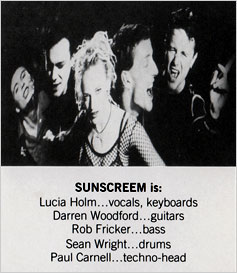
Continued hard graft on the club circuit was followed into the new year by their second single, Pressure, which reached #60 on the national charts.
By July ’92, a full-scale release of the double-pack 12-inch version of Love U More, featuring mixes by the band, Slam, and Farley/Heller, had reached #1 on all three UK dance charts. In the US (as an import), it appeared on no less than four alternative and rock charts. Working the melodic edge in its favor, the catchy song format slipped in sweetly (with consummate ease) between the gutsy ethic of a club anthem and received excellent reactions in both clubs and press. It peaked at #23 on the national charts, finally catapulting Sunscreem into the public domain.
“If you just want to play club music to clubber, then fine,” says Paul, “but you don’t expand.” In fact, the club environment is a different place than your car or working in a factory with the radio all day. To be able to take the music out of the clubs and into a format of conventional ideas, it has to be converted in a way that the uninitiated can understand. And Sunscreem realized that utilizing a song format was an ideal waiting to transcend that hurdle.
Nothing could stop them. Two months later, the beautifully melancholic Perfect Motion destroyed everything in sight, playlisted and plotted on every DJ’s chart, finally reaching #18 nationally.
Commencing a mammoth 52-date tour, this time largely playing colleges rather than clubs, the reaction was excellent. Melody Maker described Sunscreem as “the UK’s most innovative pop band” and they made the September ’92 cover of Mixmag. It didn’t stop there, as Sunscreem crowned an incredible year by winning the DMC/Mixmag award for Best Newcomer at the Royal Albert Hall in November, 1992. It was the perfect stepping up point to their next one, their debut album O3.
Sunscreem has already achieved an important step for dance music. They have made a complete mockery of the ‘two-lads-with-a-keyboard-and-MC-miming-to-a-DAT’ scenario – which is OK to split the evening up on a clubnight when a PA appears sandwiched between DJs, but Sunscreem has directly taken this angle and made their shows into the event itself.
Sunscreem incorporates all the exciting aspects of clubbing and a live band, then melts them into a visual extravaganza. They undoubtedly lead the way in this unique field. “We could play to DATs,” says Paul, “It would be easy but, to be honest, we’d get so bored with it. Playing our way, there’s so much you can do, we can manipulate our sound and change parts every night if we like, that’s what keeps us fresh.”
Sunscreem has avoided becoming just another product of the pop/rave scenario. There is substantially more to their setup. They have taken a genre of the dance scene and created a unique halo of their own from it, something of which they are rightly proud.
To hold up Sunscreem as ambassadors for the future is no exaggeration. By incorporating real instruments into a technological setup they’ve fertilized a more organic sound, uniquely integrating sounds from all corners of the dance globe. They’ve already become an inspiration, a pointer to where popular dance music must direct itself if it wants to remain healthy and alert.
Gallery


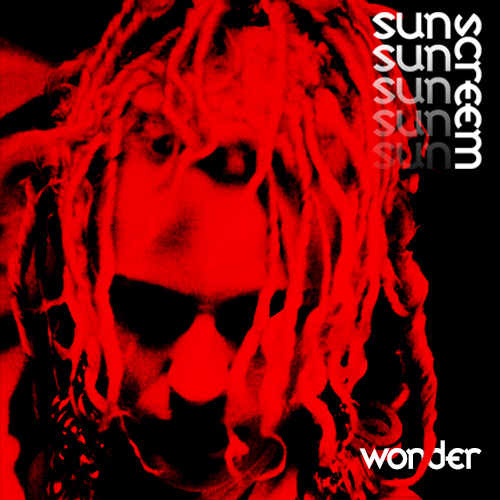
Wonder
Title:
Wonder (Alternative Version)
Artist:
Sunscreem
Album:
Out of the Woods
Links:
Written by Holm / Carnell. Programmed by Lucia Holm. Produced and mixed by Sunscreem and Julian Mendelsohn (1997).
℗ 2012 Annalogic Ltd.
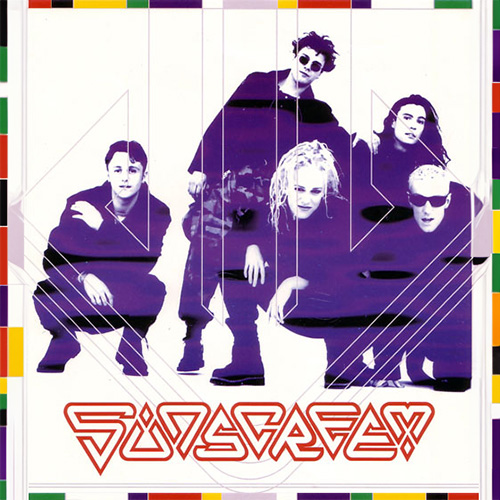
Sony Music News Release
Sunscreem Biography
by Sony Music / © 1993 Sony Music Entertainment (UK) Ltd
“In England it’s definitely singles, singles, singles, singles,” says Lucia Holm, the beautifully blonde, half-Finnish vocalist of pop techno hitmakers Sunscreem. This musically skilled quintet has applied a love for modern electronics and the hip dance music scene to serious songwriting and experimentation.
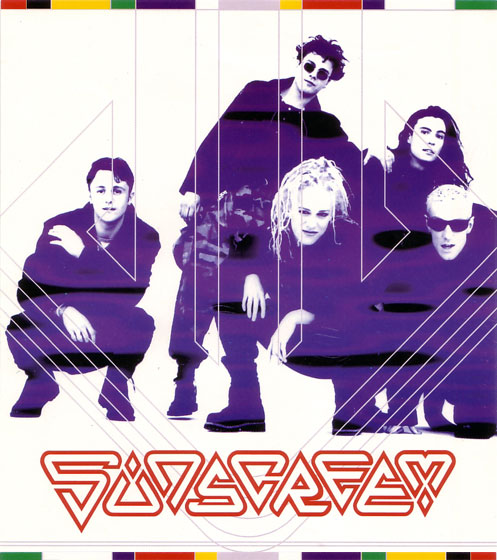
“There’s a lot of snobbery there that can be hard to cope with,” says Lucia. “If you have songs and you’re identified as a dance band, some people find it odd and they think we’ve jumped on some bandwagon. But we’ve been doing this far longer than most people that put out dance records. And they’re so surprised that there are lyrics that have more to them than ‘Ooh baby, I love you’.” Coupled with this is the confidence of a band as equally at home playing live onstage as they are inside the recording studio.
Sunscreem has won attention for their lead singer’s ragga locks and the fact that they’re a 5-piece live band – Holm, keyboard/synth player Paul Carnell, guitarist Darren Woodford, bassist Rob Fricker, drummer Sean Wright (and sometimes a DJ and two male dancers) – but they also craft great songs with full melodies and lyrics.
England’s latest techno dance crossover success may seem to have come out of nowhere, with their singles riding high on the British dance charts, but Sunscreem has been at it for years. Their string of UK hits, including the chart-topping Love U More, Pressure, Broken English, and Perfect Motion are among the baker’s dozen cuts to be found on O3, Sunscreem’s debut album.
Though on techno’s cutting edge, the Sunscreem sound has evolved from an intimate association with their machines – without worrying about current trends. “The band’s name comes from a sound on the synthesizer,” says Carnell, Holm’s primary partner-in-crime. “The sound’s on our track Psycho. It’s one of Lucia’s favorite sounds. Depending on how hard you hit the key, it either explodes or it gives a very mellow sound.”
His statement sums up the album’s range as well. Self-produced, Sunscreem’s debut features tracks that traverse the boundaries between hardcore techno, classic house, electronic pop, and driving atmospherics. The music on O3 reflects the band’s experience in song construction. This experience carried over to their innovative cover of Marianne Faithfull’s groundbreaking Broken English. Its inclusion shows Sunscreem’s sense of progressive electro pop history as well as an appreciation of a song with real feel.
Sunscreem’s musical depth made the creation of their biggest record yet, the pulsing, synth-rich Love U More, a simple process. “Lucia wrote the lyrics in one go,” says Paul. “It varies of course; on some songs we’ll spend days and days, the other 90% is written in a few minutes. Love U More is a very ambiguous song – in one sense it’s a love song, on the other hand it’s an ‘I can’t love you’ song. There’s also quite a lot of nature references, so it’s an environmental song, too.”
At Sunscreem’s core lie Carnell and Holm and their particular histories. For a band so technologically wise, both incorporate an ironic love and devotion of the organic. Paul’s recording studio is in the near-rural suburb of Essex and is built in an old barn. “I grew up literally 800 yards from the studio, so I’ve lived in this part of the country all my life in the middle of nowhere.”
Nonetheless, at 31, he has learned a lot about music and recording. When he first started taking piano lessons at age of six, he also got a special education. “I had quite an unusual piano teacher who didn’t really believe in teaching people to read music,” Paul says. “She used to write a lot of music herself and taught her pupils how to read by ear.”
Electronic music entered Paul’s life early on. “When I got to secondary school, I just taught myself and played by ear,” he recalls. “Even with the first group I had at school, I had an old Revox tape recorder and a set of oscillators which was basically circuits from a synthesizer. But we didn’t have any keyboards, so we generated it all by twiddling knobs.”
Depeche Mode, one of the first electronic pop bands to reach mega-stardom, came from Paul’s town. “They just found the right combination of people,” he comments. “My first group was RLD – I can’t remember what it stood for – and the next was called the Abraham Darby III. We just weren’t ready yet. After I left school, it was just a bassist, a drummer, and myself on keyboards. Very technologically orientated, it was called Newspeak. We actually had a small independent label deal and had one single released on a label called Storkbeat. But it died a death. This was in 1979 or ’80.”
During this time, Paul taught music and worked odd jobs, but making it musically was his obsession. “I was forming a new band,” he continues, “and we had a drummer, myself, and a singer. We were looking for a bass player, and Lucia put an advertisement in the local music shop saying she was a cello player looking for a band. Our drummer – not being entirely sure what a cello was but thinking it might be a round the bass spectrum – rang up Lucia and asked, ‘This cello thing, is it a bass or what?’ Well, she claimed she could play a bit of bass as well, so she came along originally as a bass player. We did some good tracks as Shot The Rapids and played live with sequencers just as the acid house thing was exploding in ’89. Suddenly we were going out to clubs, hearing totally synthesized music that had a bit of Philip Glass, rap, house piano, and sometimes a soaring melody. So we thought ‘Right, let’s get on with it!’”
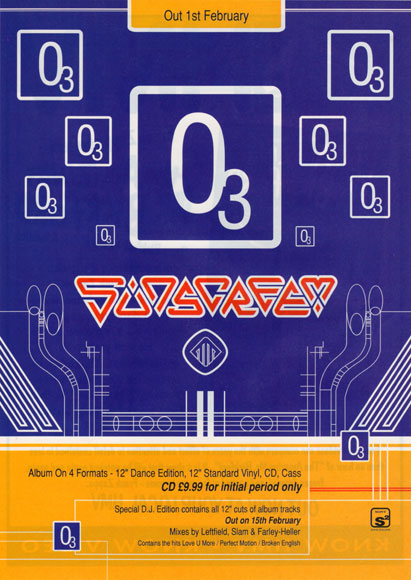
Lucia, whose father was a gardener, was torn between music and a love of nature. She had even worked on a farm for over a year after leaving college. Maybe because of Lucia’s love of the modern and the traditional, her combination of throbbing dance pulses and old-fashioned songwriting is musically effective.
“I was born in Kent,” she begins, “and always tried to make instruments from my Mum’s wine glasses or string guitars. At 8, I had the choice in school to play an instrument, either violin or cello. I chose cello. It’s a nice, sexy instrument that makes nice, sexy sounds and is in the shape of another human.
After I finished high school I went to Dartington College of Arts deep in southwest England. They had drama, music and art there, but I only did music and a bit of dance. The most interesting course I took was 20th century music, which ranged from English folk and electronic music to Japanese, African, and Balinese music. I got into all that systems music too, the modern stuff as well, like Philip Glass.”
In the learn years before they signed with a major label, Lucia supported herself through a private list of clients who either solicited her skills in gardening or as a music teacher. From such sensibilities, she adds a warmth musically and lyrically. “I played some cello here – double-tracked on the opening of Pressure – but we mixed it down a bit,” she explains. “On the next album, we’ll have lots more cello and maybe some of the African music that I’ve gotten interested in.”
The rest of the band members bring in other key elements. “As well as being a guitarist, Darren brought a studio engineer’s expertise to the whole equation,” says Paul. “Since the age of 14, he had worked in a local studio close to here. So Lucia, myself, and Darren had been working on demos in the evenings trying things out in our studio, and as we became more involved in the dance thing, the three of us started moving more in that direction.”
Finally they sought a drummer and bassist. “The three of us advertised in the music papers,” Paul tells, “yet funnily enough, both Rob and Sean were met through word of mouth. We rang up all the music shops and asked if they knew any bass players. That’s how we met Rob. We wanted someone who was into the club and dance scene, which Rob had been involved with – he had even put out some raves. And he was a gregarious stage personality. Once he finally joined in February ’90, we formed this band.”
The intent was always to be a live performing unit, not just a studio concept. “Once there were five of us,” says Paul, “we started playing gigs but in a fairly unconventional way – at raves or parties. Sometimes we would take over a more conventional venue and put on an evening that was like a warehouse party. Gigs such as these drew the attention of major labels. At that point, we didn’t have a record out and we’d only played a half-dozen live dates. The an A&R man from another label saw one of our live performances and got very excited. He spread the word and, within a couple of months, we had most of the major record companies interested in doing something with us. It all happened very, very quickly. By the time we got round to Christmas ’90, we had offers from other labels and Sony.”
Sunscreem was signed to the company in February ’91, through SoHo Square, a label started by Muff Winwood, the famed rock producer. “He approached us and said, ‘Effectively, you’ll be on a small label within a bigger label’,” explains Paul. “If we’d gone for a strictly dance music label, that might have been wrong for us because our music takes its inspiration from the underground rave thing, it’s of so many different styles.”
Sunscreem is launching their American debut on Columbia following a year of climbing both the British dance charts and pop charts. While attention is sure to follow them in the US as it did in England, hopefully it will not be as some fashion-conscious bopper band. Otherwise, they may have to endure having tales told about them like those in the British press of Mervyn the tortoise.
“There’s this chart show in England where they play the video, and snippets of useless info about the band go up on screen,” Lucia says. “Our A&R lady was feeling a bit mischievous and decided that I had a pet tortoise named Mervyn, which is Muff Winwood’s real name, and that I took the tortoise on tour with us.”
“We were touring Scotland,” Paul continues, “and people asked, ‘Where is your tortoise?’ We had no idea what they were talking about. We hadn’t seen the mentions in the papers. Another time a headline said Lucia was knocked out by sprouts. She’s allergic to sprouts, but they claimed she ate a plate of them and was laid up in the hospital and almost couldn’t do the tour.”
Sunscreem isn’t a teeny bop pop band where members are youthful entrepreneurs jumping on the techno rave bandwagon that swept through the clubs and then spread to huge outdoor events and Britain’s pop charts. Nor are they a crew of studio-wise but instrumentally unskilled deejays who have sampled and remixed their way into popdom. This band’s future lies less in press clips and more in the three S’s – synthesizers, sequencers, and samplers.
“Our musical taste is evolving all the time,” Lucia sums up. “We’re always changing things, hence all the remixes. We’ve got the studio, so we can do it quite easily ourselves, which allows us to evolve really slowly and do our own thing. It’s no good following fashion.”
Gallery




